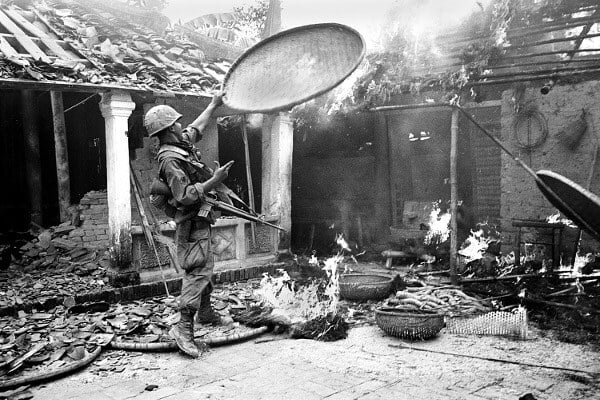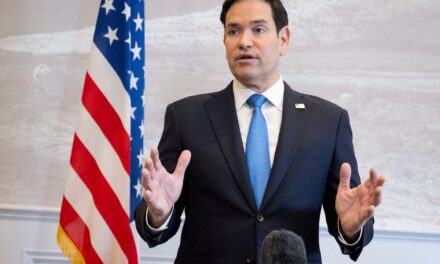There’s an article in the New York Times on Wednesday about Syrians who are returning to their home towns and villages after years of civil war only to discover that they are riddled with mines and unexploded ordinance. Meanwhile, there’s an article in the Washington Post about Vietnam’s struggle to recover from its war with America that ended 50 years ago.
It’s unclear if Syria will eventually find international partners to assist them in making their country safe again, but until Donald Trump’s fascist regime came to power in January 2025, the Vietnamese had a partner in America.
Reconciliation with Vietnam has been a long, slow and arduous process. One milestone came in 2023, when President Joe Biden visited Vietnam and announced a “comprehensive strategic partnership” between the two countries. That’s the highest bilateral relationship the U.S. can have, and it came with a bunch of initiatives, most of which have been canceled by the Trump’s regime.
Most of the bilateral work being done in Vietnam was led either by the U.S. Agency for International Development (USAID) or the U.S. Institute of Peace (USIP), both of which have been essentially shuttered by Trump. Two examples of what this means involve mine/ordinance clearance and cleaning of up dioxin in soil contaminated by Agent Orange.
Here’s the Washington Post‘s reporting on the impact on the first example:
QUANG TRI PROVINCE, Vietnam — The Vietnamese deminers who find and destroy the deadly remnants of America’s war here were on break for Lunar New Year when they received word an executive order by President Donald Trump had suspended funding for their work.
For a month, they hung up the khaki uniforms stitched with American flag patches, left their metal detectors in storage, and rerouted reports of grenades, cluster munitions and mortars to the Vietnamese authorities.
“People were calling us every day,” remembered Tran Binh Phuong, who leads several hundred personnel in the largest demining operation in central Vietnam’s Quang Tri province — an effort that relies wholly on U.S. funding. “They asked why, when this land still has so many explosives that continue to go off, why the funding was halted.”
I’ll get to why I think the funding was halted, but I don’t think any thought was put into it at all. Nor do I think any thought was put into the second example. In 2018, “USAID signed an agreement to undertake the cleanup of soil contaminated with hazardous dioxin from Agent Orange at a former American [Bien Hoa] air base.” Here is how that is going:
At Bien Hoa, progress has stalled because Washington will not approve the release of funding to a contractor hired to build a treatment plant. More than 100,000 cubic meters of dioxin-contaminated soil has already been excavated and cannot be left untreated for too long, particularly after the arrival of heavy rains in May, warn USAID officials.
I believe it’s a mistake to think these contracts were canceled or disrupted because the American regime has some specific problem with them. What they have a problem with is the two main agencies, USAID and USIP, that do this kind of work. But that doesn’t mean the Trump administration doesn’t have a beef with Vietnam.
No one exemplifies this better than Peter Navarro, the regime’s senior counselor for trade and manufacturing, who was released from federal prison on July 17, 2024 after serving four months for contempt of Congress. He was a leading advocate for placing an astronomical 46 percent tariff on imports from Vietnam. When Vietnam responded by offering to eliminate all tariffs on imported American goods, Navarro reacted with contempt.
White House trade advisor Peter Navarro said Monday that an offer by Vietnam to eliminate tariffs on U.S. imports would not be enough for the administration to lift its new levies announced last week.
“Let’s take Vietnam. When they come to us and say ‘we’ll go to zero tariffs,’ that means nothing to us because it’s the nontariff cheating that matters,” Navarro said on CNBC’s “Squawk Box.”
The examples of nontariff “cheating” cited by Navarro included Chinese products being routed through Vietnam, intellectual property theft and a value-added tax.
Navarro believes that China has sought to work around American tariffs by rerouting some manufacturing to Vietnam. So, the idea is that slapping a gigantic tariff on Vietnam will put an end to this practice. I don’t think the thinking goes any deeper than this, and if it winds up negatively affecting U.S.-Vietnam relations and unwinding decades of efforts at reconciliation and cooperation, that doesn’t matter to Navarro or Trump at all.
The same is true with the ideological war on USAID and USIP. They don’t care what harm this does in Vietnam or anywhere else. It makes me think on the ending of F. Scott Fitzgerald’s The Great Gatsby:
“They were careless people, Tom and Daisy- they smashed up things and creatures and then retreated back into their money or their vast carelessness or whatever it was that kept them together, and let other people clean up the mess they had made.”
One of the nice things about America’s effort to help Vietnam clean up Agent Orange and mines and unexploded ordinance is that showed that we are not like Tom and Daisy Buchanan from The Great Gatsby. We weren’t letting other people clean up the mess we had made there.
But that is no longer true.
And here’s another tragic element to this. One of the causes of America’s tragic error in Vietnam is that our experts falsely believed that Vietnam was in the thrall of Communist China. They didn’t understand that Vietnam was just as interested in independence from China as they were in independence from France and the United States. Despite accepting military assistance from China, and despite sharing their communist ideology, Vietnam wanted to run its own affairs.
And this played out in the postwar years and is one of the reasons why Vietnam was eager to build a relationship with America despite the fact that the war we waged on their soil cost the lives of an estimated 2,000,000 civilians on both sides and some 1,100,000 North Vietnamese and Viet Cong fighters.
They were willing to put bitterness aside in the interest of prosperity and protection against Chinese domination. But the likely outcome of the tariffs and the cancellation of bipartisan cooperation is that Vietnam will move into China’s orbit because they lack alternatives.
So, not only are we now shirking our commitments to clean up the mess we made in Vietnam, the policy we’re pursuing to punish China is actually going to benefit China.
These are things that happen when your country is run by a fascist regime.
.






